Subcontractors Push for Timely Change‑Order Payments; ASM and Members Urge H.3334
Get AI-powered insights, summaries, and transcripts
Subscribe
Summary
Jim Welch of the Associated Subcontractors of Massachusetts and multiple subcontractors testified Oct. 8 in support of House Bill 3,334 to require timely approval and payment of change orders on public construction projects.
Jim Welch, executive director of the Associated Subcontractors of Massachusetts (ASM), and several subcontractors testified before the Joint Committee on Oct. 8 in support of House Bill 3,334, “an act relative to timely public payments for work not included in original construction contracts.” The bill was described in testimony as establishing enforceable time frames for public awarding authorities to approve or reject change orders so subcontractors can invoice and be paid promptly.
Steven Amanti, COO of E. Amanti and Sons and incoming president of ASM, explained that change orders are additional work arising from unforeseen site conditions and that, under current practice, "there is currently no time frame requiring public awarding agencies to approve or reject those changes." Amanti said the bill would "apply the same reasonable time frames in due process that has successfully governed private construction since 2010," allow contractors to bill for completed work, and provide earlier dispute‑resolution rights.
Leslie Carrillo, president of Deep Holloway Mosaic Company and ASM, described the effect on small firms: she said change orders can be approved after long delays—"Dipali waited 2 years for a change order on a state transportation project, 10 months at a public university"—and that the waits "tie up my funds" and prevent hiring. Adene Doneski, co‑owner and executive vice president of Gleeson Powers, gave two company examples she said experienced multi‑year waits for change order approval and payment: a public housing project where change orders submitted in early 2021 were not finally approved until May 2025 and a high school project where approval took 18 months.
Witnesses said delayed approvals force subcontractors to finance public work out of pocket, erode small businesses’ ability to bid on public projects, and reduce competition. Trish Boyden, president of United Stoneman Site, described cases in which subcontractors accepted reduced payments (she said one contract line was taken at about "40 cents on the dollar") to close out jobs and avoid prolonged nonpayment.
Committee members asked clarifying questions about the range and magnitude of costs carried by subcontractors; witnesses cited project examples where original contracts (roughly $300,000 and $500,000 in the examples) grew to roughly $600,000 and $800,000 after change orders. Witnesses urged the committee to extend the private‑sector prompt‑pay framework to public projects.
Why it matters: Proponents said H.3334 would protect subcontractors’ cash flow, encourage small and emerging firms to bid on public work, and reduce long‑running disputes that raise costs for taxpayers and limit competition. The hearing record contains multiple company examples and written testimony. No formal committee vote on the bill was recorded at the hearing.
